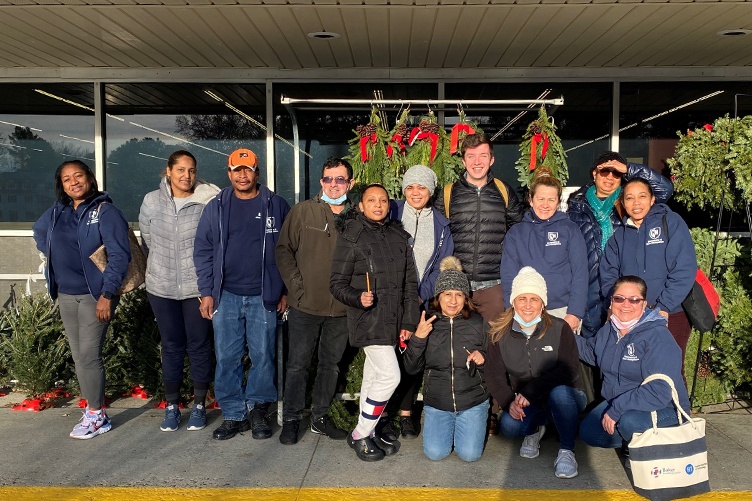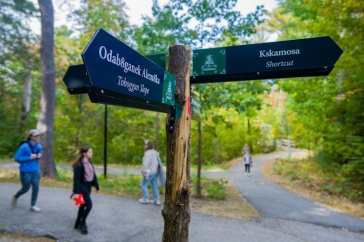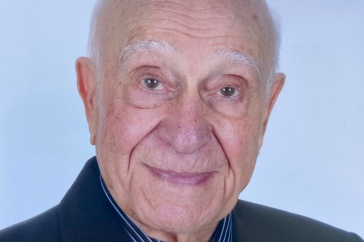
The Conversational English class at Hannaford's in Durham where they went on a scavenger hunt.
“I come home from grabbing the groceries. I see my two grandsons playing in the front yard with the dog, and my daughter is preparing dinner. It's a lovely day outside with the sun shining. It's going to be a great day.” — Azucena Collazo
If you asked UNH housekeeper Azucena Collazo how her day went this fall, this is what she would have told you. She couldn’t have told you this last summer, not because she wasn’t looking forward to having a great day but because she couldn’t speak English. But that was then. Today, as Collazo approaches the end of her seven-week English Conversation class, she and roughly 25 of her colleagues are feeling more at home in the English language.
Like many of her colleagues, Collazo is from the Dominican Republic and works as a housekeeper charged with keeping the campus residence halls in tip top shape. No easy task for anybody but even harder for those who don’t speak English. If you think about it, ideally housekeepers and students should work together in partnership to take care of their spaces and support each other, so being able to greet one another on a daily basis, inquire how things are going and stay out of each other’s way when necessary are important.
This year, the College’s Dean Michele Dillon decided to help the University’s housekeeping staff adjust both to their responsibilities at UNH and their personal lives by funding a conversational English class. She asked Spanish Professor and COLA Faculty Fellow Scott Weintraub for help identifying an instructor. He recommended graduate student Keelan MacKenzie, who embraced the opportunity with open arms.
“We have agreed not to be timid. If we’re not making mistakes, we’re not giving ourselves enough opportunities to speak and learn from those errors.”
“I think it's really important that the university is providing an opportunity for these people to become more comfortable with English,” says MacKenzie, who is pursuing a master’s degree in Spanish. Half of the course covers job-related conversational topics and half covers life skills, such as going to the supermarket, the pharmacy, the bank and other activities many of us take for granted.
An avid soccer player and fan who caught the language bug at Mount Vernon High School (“Spanish is the universal language of soccer,” he says), MacKenzie is a big believer in applied learning. On the Wednesday before Thanksgiving, for example, the ESL students met for a scavenger hunt at Hannaford’s in Durham, where they broke into teams and chased down a list of items.
“To prep them, I gave each team a list of questions they could ask other customers or store employees to help them locate the various items,” explains MacKenzie. “It was so much fun because they learned to think on their feet.”
On another day, the class extemporized short skits about “life at UNH,” with the English learners adopting different roles as housekeepers, supervisors, residence advisors and hall directors, maintenance crew and even a certain presidential figure himself — all gathered together to merrily interact in a residence hall.
“Everybody wanted to be President Dean,” MacKenzie recalls.
Classes are safe spaces where students are encouraged to make mistakes and even laugh at them. Anything to discourage clamming up. “I make mistakes with my Spanish and they make them with English,” he explains. “We have agreed not to be timid. If we’re not making mistakes, we’re not giving ourselves enough opportunities to speak and learn from those errors.”
“...our UNH community is here to foster kindness and patience.”
MacKenzie clearly holds a deep affection and admiration for his students, some of whom, he notes, work multiple jobs in order to support their families. “That alone is just so inspiring,” he reflects. “And it makes my work a lot easier. I see that intrinsic motivation and want to be able to help them and their families.”
You can't learn a language in seven weeks, but MacKenzie hopes it will be enough to set a foundation upon which his enthusiastic students can build in the coming months. So far, he has gotten nothing but positive expressions of appreciation. At the end of one class, a student named Germania Sosa handed MacKenzie a note with a message that read, "Many thanks for your words. I say the key words, but my problem is the confidence and the embarrassment. A thousand thanks.”
“This message made me almost tear up,” recalls her teacher. “I feel like I helped at least one person recognize that our UNH community is here to foster kindness and patience.”
-
Written By:
Dave Moore | Freelance Writer



















































